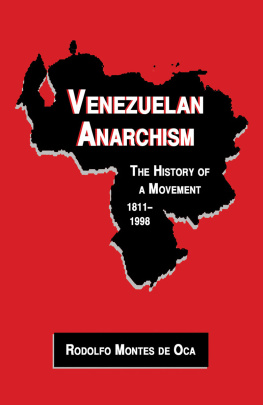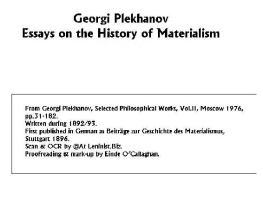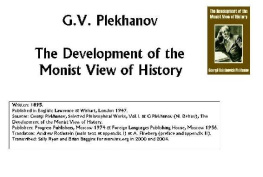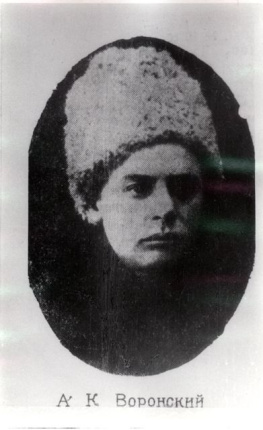PUBLISHERS' NOTE
In reprinting Anarchism and Socialism, by George Plechanoff, we realize that there is not the same need for assailing and exposing anarchism at present as there has been at different times in the past. Yet the book is valuable, not merely because of its historic interest but also to workers coming into contact with the revolutionary movement for the first time. The general conception of anarchism that a beginner often gets is that it is something extremely advanced. It is often expressed somewhat as follows: "After capitalism comes socialism and then comes anarchism." Plechanoff very ably explodes such notions.
Within the pages of this work the author shows not only the reactionary character of anarchism, but he exposes its class bias and its empty philosophic idealism and utopian program. He shows anarchism to be just the opposite of scientific socialism or communism. It aims at a society dominated by individualism, which is simply a capitalist ideal. Such ideals as "liberty," "equality," "fraternity," first sprang from the ranks of the petty property owners of early capitalism, as Plechanoff shows. He also points out that while Proudhon is usually credited with being "the father of anarchism" that actually Max Stirner comes closer to being its "father." Stirner's "League of Egoists," he says, "is only the utopia of a petty bourgeois in revolt. In this sense one may say he has spoken the last word of bourgeois individualism."
Bakounine and Kropotkine, the famous Russian anarchists, are exposed as confused idealists, who have not aided but rather hindered the development of the working-class movement. Lenin speaks highly of the book in this relation, but takes Plechanoff severely to task for his failure properly to set forth the Marxian concepts of the State, and for his total evasion of the form the State must take during the time it is in the hands of the workers. When writing on the "Vulgarisation of Marx by the Opportunists," in his State and Revolution, Lenin said:
"Plechanoff devoted a special pamphlet to the question of the relation of socialism to anarchism entitled Anarchism and Socialism, published in German in 1894. He managed somehow to treat the question without touching on the most vital, controversial point, the essential point politically, in the struggle with the anarchists: the relation of the revolution to State, and the question of the State in general. His pamphlet may be divided into two parts: one, historico-literary, containing valuable material for the history of the ideas of Stirner, Proudhon, and others; the second, ignorant and narrow-minded, containing a clumsy disquisition on the theme 'that an anarchist cannot be distinguished from a bandit,' an amusing combination of subjects and most characteristic of the entire activity of Plechanoff on the eve of revolution and during the revolutionary period in Russia. Indeed, in the years 1908 to 1917 Plechanoff showed himself to be half doctrinaire and half philistine, walking, politically, in the wake of the bourgeoisie.
"We saw how Marx and Engels, in their polemics against the anarchists, explained most thoroughly their views on the relation of the revolution to the State. Engels, when editing in 1891, Marx's Criticism of the Gotha Program, wrote that 'we'that is, Engels and Marx'were then in the fiercest phase of our battle with Bakounine and his anarchists; hardly two years had then passed since the Hague Congress of the International' (the First). The anarchists had tried to claim the Paris Commune as their 'own,' as a confirmation of their teachings, thus showing that they had not in the least understood the lessons of the Commune or the analysis of those lessons by Marx. Anarchism has given nothing approaching a true solution of the concrete political problems: are we to break up the old State machine, and what shall we put in its place?
"But to speak of Anarchism and Socialism, leaving the whole question of the State out of account and taking no notice at all of the whole development of Marxism before and after the Communethat meant an inevitable fall into the pit of opportunism. For that is just what opportunism wantsto keep these two questions in abeyance. To secure this is, in itself, a victory of opportunism."
The anarchist desire to abolish the State at one blow, and to abolish money, etc., in much the same way, springs from their inability to understand the institutions of capitalist society. To many of them the State is simply the result of people having faith in authority. Give up this belief and the State will cease to exist. It is a myth like God and rests entirely on faith. The anarchist's desire for the abolition of the State arises from entirely different concepts to that of the communists. To these anarchist anti-authoritarians the State is simply bad. It is the most authoritarian thing in sight. It interferes with individual freedom and consequently is the greatest obstruction to "absolute liberty" and other utopian desires of the champions of individualism.
Communists also want a society without a State but realize that such can only come about when society is without classes. The aim of the communist movement is to destroy the capitalist form of the State and substitute a proletarian form during the time in which society is undergoing its classless transformation. When all property is centralized into the hands of this working-class "State" and when the administration of things has taken the place of political dominance, the State, in its final form, will have withered away. Therefore, the communist realizes that the State cannot be abolished in the manner visualized by anarchists, but that it must be used, that is, the proletariat must be raised "to the position of ruling class," for the purpose of expropriating the capitalists and putting an end to the exploitation of the producing class. The State is not abolished. Only its capitalist form is abolished. The State dies out in the hands of the workers when there is no longer an opposing class to coerce.













